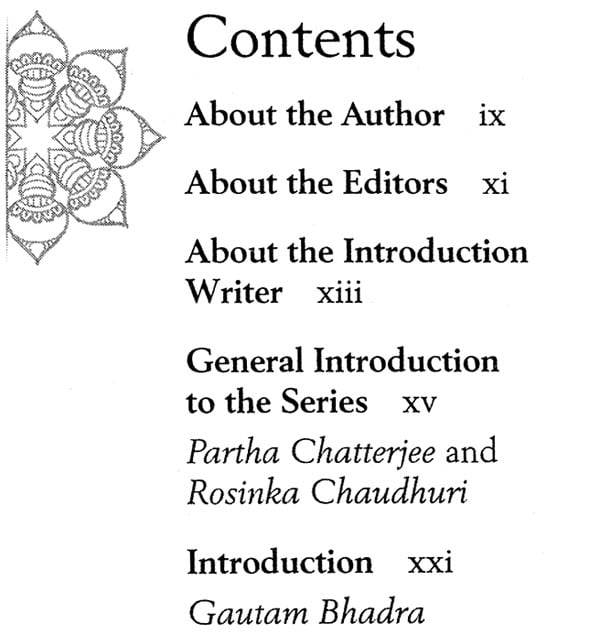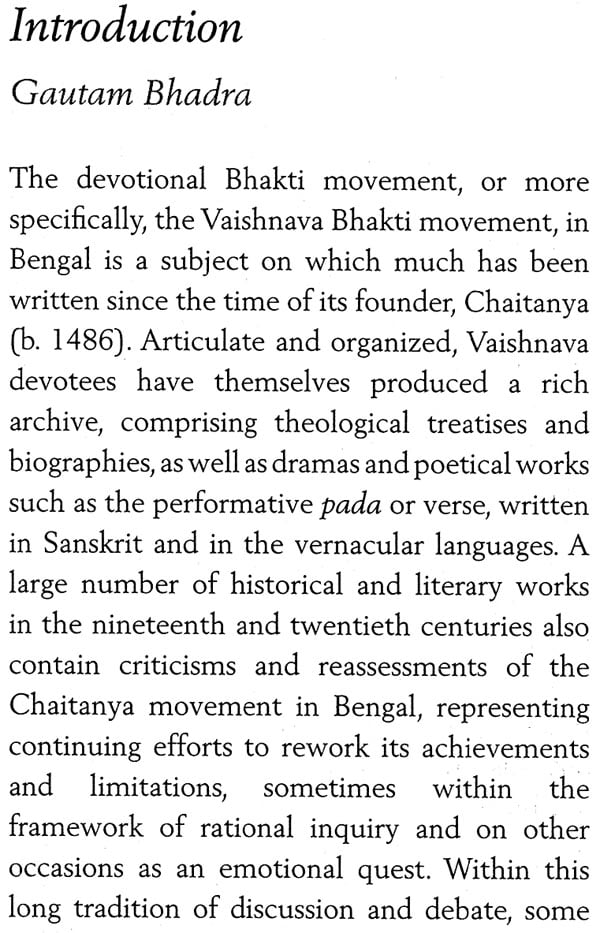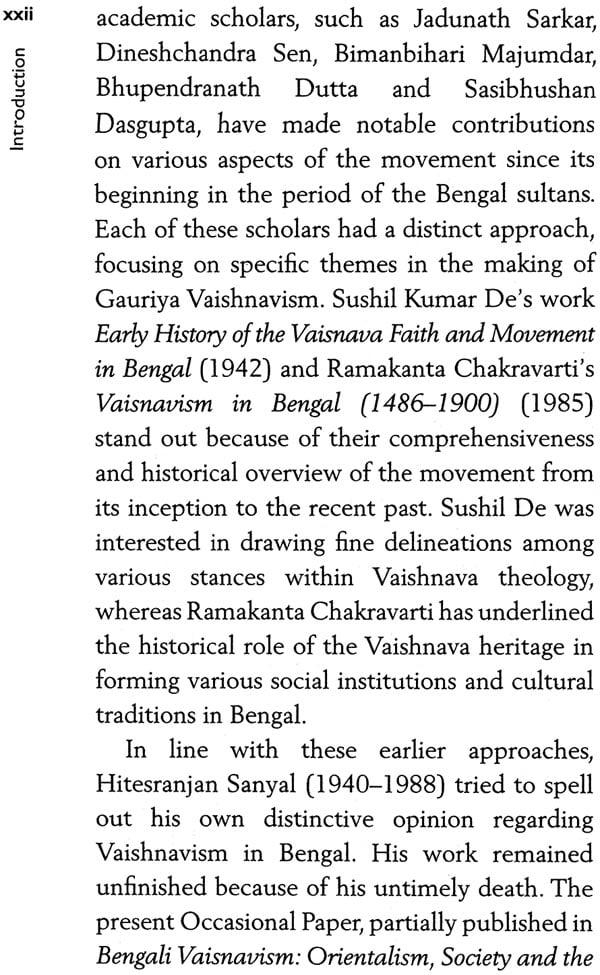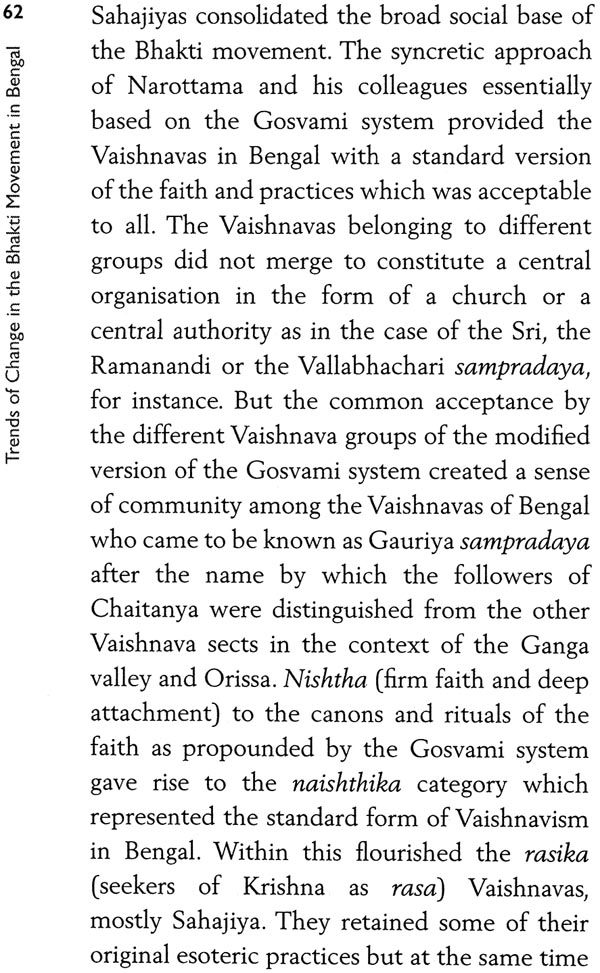
Trends of Change in The Bhakti Movement in Bengal
Book Specification
| Item Code: | NAR496 |
| Author: | Gautam Bhadra |
| Publisher: | Oxford University Press, New Delhi |
| Language: | English |
| Edition: | 2019 |
| ISBN: | 9780199486700 |
| Pages: | 118 |
| Cover: | HARDCOVER |
| Other Details | 7.00 X 4.50 inch |
| Weight | 150 gm |
Book Description
Hitesranjan Sanyal’s Trends of Change in the Bhakti Movement in Bengal, despite remaining unfinished due to his untimely demise, is a seminal work on the devotional Bhakti movement. In this work the author spells out the multipronged and differential impact that Vaishnava Bhakti culture had on medieval Bengal and shows us how it aided the formation of the emotional world of the region.
Hitesranjan Sanyal (1940-1988) studied Ancient Indian History and received his PhD from the University of Calcutta. He was Fellow in History at the Centre for Studies in Social Sciences, Calcutta (CSSSC) from 1973 to his sudden and untimely death. His book Social Mobility in Bengal was published in 1987. Bangla Kirtaner Itihas (1989), on the history of the Vaishnava musical form of kirtan, and Swarajer Pathe (1993), his collected essays on the nationalist movement in Bengal, were published posthumously, as was his Selected Writings (2004) containing his essays on temple building and architecture.
This series of publications from Oxford University Press brings to a general audience a selection of the papers and lectures delivered at the Centre for Studies in Social Sciences, Calcutta (CSSSC), over the last four decades. They fall into two categories: first, a chosen few from among the Occasional Papers circulated by the Centre's faculty and second, from the two series of memorial lectures in the name of Sakharam Ganesh Deuskar, for lectures on Indian history and culture, and Romesh Chunder Dutt, for lectures on political economy.
The CSSSC was founded in 1973 as an autonomous research institute financed primarily by the Indian Council for Social Science Research and the Government of West Bengal. Since then, the Centre, as it is ubiquitously known, has established an academic reputation that places it at the crest of research institutes of excellence in India. Its faculty works in the fields of history, political science, sociology, social anthropology, geography, economics, and cultural studies. Its unique interdisciplinary culture allows for collaborations between scholars from different fields of research that might not find support in traditional department-based institutions, attracting students and researchers from across the country and abroad.
The R.C. Dutt Lectures at the CSSSC have focused on themes from economic theory, economic history, and development policy, mostly relating to India. As is well known, Romesh Chunder Dutt (1848-1909) served in the Indian Civil Service from 1871 to 1897. On retirement, he lectured at the University of London, UK, and wrote his classic work in two volumes, The Economic History of India under Early British Rule (1902) and The Economic History of India in the Victorian Age (1904). He was elected president of the 1899 session of the Indian National Congress. Apart from his extensive writings on the colonial economy, the condition of the peasantry, famines, and land rights, Dutt was also a poet in English and a novelist in Bengali, writing on historical and social themes. Over the years, some of the most eminent economists of India have delivered the R.C. Dutt lectures at the Centre. Among them are Sukhamoy Chakrabarti, K.N. Raj, V.M. Dandekar, Ashok Rudra, Krishna Bharadwaj, A. Vaidyanathan, Suresh Tendulkar, Prabhat Patnaik, I.S. Gulati, Amit Bhaduri, C.T. Kurien, Praveen Visaria, Kaushik Basu, Geeta Sen, Debraj Ray, Abhijit V. Banerjee, Ravi Kanbur, and Dilip Mookerjee. The lectures selected for publication in the present series will capture key debates among Indian economists in the last four decades in topics such as the crisis of planning, economic liberalization, inequality, gender and development, sustainable growth, and the effects of globalization.
The S.G. Deuskar Lectures began as a series on Indian nationalism but widened to reflect the cross-disciplinary interests the CSSSC nurtured, featuring a range of distinguished speakers on the history, culture, politics, and society of India. Sakharam Ganesh Deuskar (1869-1912) was Maharashtrian by ancestry and member of a family that migrated in the mid-eighteenth century to the Santal Parganas on the border of Bihar and Bengal. A schoolteacher and journalist by profession, he is best known for his Bengali tract Desher Katha (1904)—a damning indictment of the exploitative and violent character of British colonial rule—which is reported to have sold 13,000 copies in five editions within five years during the Swadeshi movement in Bengal. Some of the finest scholars and artists of modern India have delivered the Deuskar Lectures, including, among historians, Ranajit Guha, Tapan Raychaudhuri, Irfan Habib, Satish Chandra, Romila Thapar, Partha Sarathi Gupta, Sabyasachi Bhattacharya, Sumit Sarkar, Dipesh Chakrabarty, Muzaffar Alam, Gyanendra Pandey, Sanjay Subrahmanyam, and Shahid Amin; among philosophers, J.N. Mohanty and Bimal Krishna Matilal; among artists and art critics, Geeta Kapur, Vivan Sundaram, K.G. Subramanyan, and Ghulam Mohammed Sheikh; among social theorists, Gayatri Chakravorty Spivak, Sudipta Kaviraj, and Veena Das. A selection of these lectures will now be reprinted in this current initiative from Oxford University Press.
**Contents and Sample Pages**











